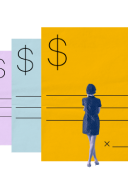Refinance my car loan
Tell us about your current loan so we can help you find loans with better terms for your situation.

Your current loan
Edit details here

Your options for refinancing
Sort by
- Monthly payment savings
- Total interest & fee savings

$2,102lower
Change in total interest cost
Est. payment/mo*
Est. APR*
Change
$35
4.84%
Current
$326
for 60 mo.
10.98%
This loan
$291
for 60 mo.
6.14%
60 months term ( 0 mo. more )
$2,102lower
Change in total interest cost
Est. payment/mo*
Est. APR*
Change
$35
4.84%
Current
$326
for 60 mo.
10.98%
This loan
$291
for 60 mo.
6.14%

$1,692lower
Change in total interest cost
Est. payment/mo*
Est. APR*
Change
$28
3.87%
Current
$326
for 60 mo.
10.98%
This loan
$298
for 60 mo.
7.11%
60 months term ( 0 mo. more )
$1,692lower
Change in total interest cost
Est. payment/mo*
Est. APR*
Change
$28
3.87%
Current
$326
for 60 mo.
10.98%
This loan
$298
for 60 mo.
7.11%

$1,419lower
Change in total interest cost
Est. payment/mo*
Est. APR*
Change
$24
3.23%
Current
$326
for 60 mo.
10.98%
This loan
$302
for 60 mo.
7.75%
60 months term ( 0 mo. more )
$1,419lower
Change in total interest cost
Est. payment/mo*
Est. APR*
Change
$24
3.23%
Current
$326
for 60 mo.
10.98%
This loan
$302
for 60 mo.
7.75%

$908lower
Change in total interest cost
Est. payment/mo*
Est. APR*
Change
$15
2.05%
Current
$326
for 60 mo.
10.98%
This loan
$311
for 60 mo.
8.93%
60 months term ( 0 mo. more )
$908lower
Change in total interest cost
Est. payment/mo*
Est. APR*
Change
$15
2.05%
Current
$326
for 60 mo.
10.98%
This loan
$311
for 60 mo.
8.93%

$605lower
Change in total interest cost
Est. payment/mo*
Est. APR*
Change
$10
1.36%
Current
$326
for 60 mo.
10.98%
This loan
$316
for 60 mo.
9.62%
60 months term ( 0 mo. more )
$605lower
Change in total interest cost
Est. payment/mo*
Est. APR*
Change
$10
1.36%
Current
$326
for 60 mo.
10.98%
This loan
$316
for 60 mo.
9.62%

$184lower
Change in total interest cost
Est. payment/mo*
Est. APR*
Change
$3
0.41%
Current
$326
for 60 mo.
10.98%
This loan
$323
for 60 mo.
10.57%
60 months term ( 0 mo. more )
$184lower
Change in total interest cost
Est. payment/mo*
Est. APR*
Change
$3
0.41%
Current
$326
for 60 mo.
10.98%
This loan
$323
for 60 mo.
10.57%

$37lower
Change in total interest cost
Est. payment/mo*
Est. APR*
Change
$1
0.08%
Current
$326
for 60 mo.
10.98%
This loan
$325
for 60 mo.
10.90%
60 months term ( 0 mo. more )
$37lower
Change in total interest cost
Est. payment/mo*
Est. APR*
Change
$1
0.08%
Current
$326
for 60 mo.
10.98%
This loan
$325
for 60 mo.
10.90%

Why refinance my car loan?
Refinancing your car loan can save you money monthly, in the long run, or both.
*Annual Percentage Rates, terms of loan, and monthly payments presented are estimated based upon analysis of information you entered, your credit profile and/or available rate information from lenders. While efforts have been made to maintain accurate information, the loan information is presented without warranty and the estimated APR or other terms presented do not bind any lender. Lenders generally have a range of available APRs (for example, a lender's range might be 2% to 24%) and only borrowers with excellent credit will qualify for the lowest rate available. Your actual APR will depend upon factors evaluated at the time of application, which may include credit score, loan amount, loan term, vehicle information, credit usage and history. All loans are subject to credit review and approval. Additionally, model year, loan-to-value, minimum loan balance mileage, income, debt, etc. restrictions may apply. When evaluating offers, please review the lender's Terms and Conditions for additional details.
†Calculations of savings are estimated based upon information entered by the consumer and average usage information combined with the lender's offer data. These estimates are presented for illustration purposes only.
